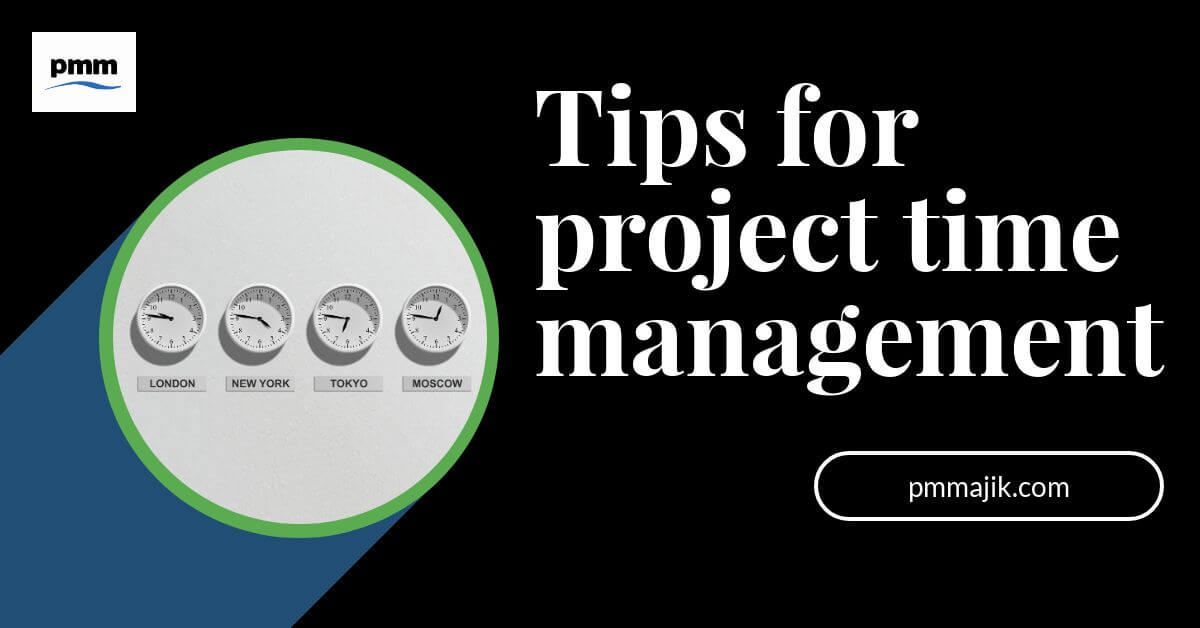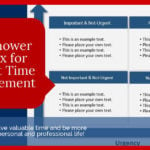Time management is defined as making the most of the time available. It is perhaps one of the most important aspects of a project, and one of the most difficult to get right.
Here are some tips you can follow to ensure that gain effective time management skills
Schedule and plan
The most important tip, and the only place to start this article, is to plan your project and schedule each task. This will ensure that all team members know exactly what is expected of them and the regular milestones they are aiming towards. This clarity will mean you spend a lot less time dealing with issues and the project will run efficiently.
Set shorter deadlines
Whilst you might assume that setting shorter deadlines will put you and your team members under pressure, the opposite may actually be true.
Parkinson’s Law states that the more time you are allocated to complete a task, the more chance you’ll procrastinate rather than using the time to complete the task earlier. The work will expand to fit the time-frame, it won’t be completed any quicker and thus, you could be wasting valuable time.
Use information from previous projects
Don’t try to reinvent the wheel when undertaking your project. If something worked well on a previous project and provided a successful outcome, then incorporate it into yours. If something didn’t work well then make sure that you don’t follow the same mistake.
Turn off email alerts
Emails can be one of the most distracting tasks in the workplace. Often an email will pop up which you feel obliged to action or reply to straight away and your focus will be taken away from the project.
Schedule in a daily time when you will look at and reply to emails and turn off alerts so that you aren’t tempted to stray off task. By keeping to a strict time-frame you will become much more effective.
Use a to-do list
Create a list daily of the tasks that you need to complete. This will keep you focussed on your objectives and creates a real satisfaction when a task is crossed off, increasing productivity.
Sometimes providing a to-do list to your team can overwhelm them so you may want to use the Eisenhower matrix to prioritise tasks. The matrix is split into four categories:
- Important and urgent
- Important but not urgent
- Not important but urgent
- Not important and not urgent
Keep meetings to a minimum
As anyone who’s worked on a project will know, team meetings have a tendency to spiral out of control in terms of time. Avoid this by creating a focussed agenda and a specific time frame for your meeting and stick to it during meetings.
Time can also be saved by avoiding asking every team member for an update, just focus on risks, issues and opportunities.
Work on the 80/20 rule
The 80/20 rule posits that focusing on the 20% of the work that matters most will create 80% of the results. To use your time effectively, you should therefore concentrate on the tasks most important to project success.
This rule also applies to staff, and yourself. Work should be scheduled at 80% of your contracted daily hours. This leaves time for last-minute requests and allows for work outside of the project such as catching up with emails, attending meetings or self-development.
Avoid micro managing your team and doing the work
As the Project Manager you don’t need to know every specific detail of the project, you’ve selected a highly capable team so let them get on with their tasks and focus on the wider project.
Similarly, you should avoid getting involved in the “doing”. Although it may be tempting to get hands-on with tasks that are nearing the deadline, you need to keep your eye on the project as neglecting this can lead to problems.
Avoid multi-tasking
Whilst you may think that multi-tasking is one of the main ways in which you can manage your time effectively, it actually causes more harm than good.
When switching from one task to another, the human brain needs time to complete this switch, which means a time lag can be created if you are trying to complete too many tasks at once.
To avoid this focus on one task at a time and give your brain chance to switch off once it is completed by taking a short break.
Practice good housekeeping
Good housekeeping will keep you organised and enable you to access resources in a timely manner. Filing minutes from meetings in a separate folder, in date order, for example, will enable you to locate actions from those meetings quickly when you need them.
You may find that the Japanese Methodology of 5S is effective in managing your housekeeping. It consists of five steps:
- “Seiri” – sort
- “Seiton” – Straighten, set
- “Seiso” – shine, sweep
- “Seiketsu” – standarise
- “Shitsuke” – maintain
Try to remain stress-free
Stress is a key trigger in reducing productivity in the workplace, and more importantly, it can seriously affect your health.
Take regular breaks throughout the day, particularly at the end of tasks, and try to switch off outside of work hours to ensure that you come back to the project refreshed.
These tips can help you to understand how you can use your time more effectively when running a project. Essentially, it is all in the planning! Plan the project, your time, and your team’s time effectively and you are on the way to delivering a successful, timely project.






